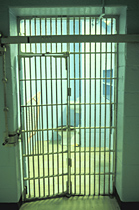2007年VOA标准英语-Rights Group Report: Pre-Trial Detention Leads(在线收听)
Johannesburg
14 June 2007
More than three million people around the world are being held in prison awaiting trial, nearly one-third of the world's total prison population. A recent study released in South Africa says pre-trial detention is used to excess in many countries and calls for reforms. Correspondent Scott Bobb reports from our bureau in Johannesburg.
 |
The New York-based Open Society Justice Initiative issued the warning following a two-year study.
The group's senior legal officer, Martin Schonteich says that each year 10 million people are arrested around the world on suspicion of criminal behavior. Some remain in jail for a few days, but some may remain for years awaiting trial.
"In many parts of the world pre-trial detention is used quite excessively," said Martin Schonteich. "And it's normally during the period of detention that most abuses by criminal justice systems against defendants occur."
Schonteich acknowledges there are acceptable reasons for detaining a criminal suspect while awaiting trial but he says law enforcement officials often do not have enough information to make such a decision.
And in countries where courts are over-burdened it may take years for a trial to be scheduled after which the accused is eventually judged innocent.
The effects of detention are many. Schonteich says the stress of being taken away from families and placed with potentially serious offenders, especially for young people, can be severe.
"One of the sad side effects of this is that the suicide rate of detainees is significantly higher if one compares it to the suicide rate of normal, sentenced prisoners," he said. "It's about three times as high."
He says the emotional impact is also high on the detainee's family and the economic impact can be devastating if the detainee is the breadwinner.
Lengthy detentions cost money, which could be used for other social programs.
And they can be a public health hazard. Detainees placed in close quarters may contract infectious diseases they transmit to their communities when they are released.
As a result, Schonteich says pre-trial detention must be carefully considered.
"[Pre-trial] detention should be used as a last resort, and then only if there are grounds to believe that a defendant will abscond, interfere with evidence or witnesses or commit a serious offense," he said.
He says judges should be given sufficient information to allow them to decide whether to detain a suspect until trial. And he says the amount of bail should be affordable for the detainee.
He cited programs in several African countries that seek alternatives to excessive pre-trial detention.
In South Africa, civic groups have set up an agency whose members interview detainees soon after their arrest and determine, through their employers or neighbors, whether it is safe to release them to await trial.
In Malawi, which has a severe shortage of lawyers, para-legal professionals are being trained to provide legal advice to detainees right after their arrest.
And in Nigeria, where police resources are stretched thin and there are many arrests, a program provides young lawyers who come quickly to police stations to offer legal advice and, through their presence, some protection from abuse to the detainee.
Finally, Schonteich says a broad-based debate is needed among law enforcement officials, human rights defenders and general society. This would help find the right balance between appropriate and excessive pre-trial detention and help governments achieve it.